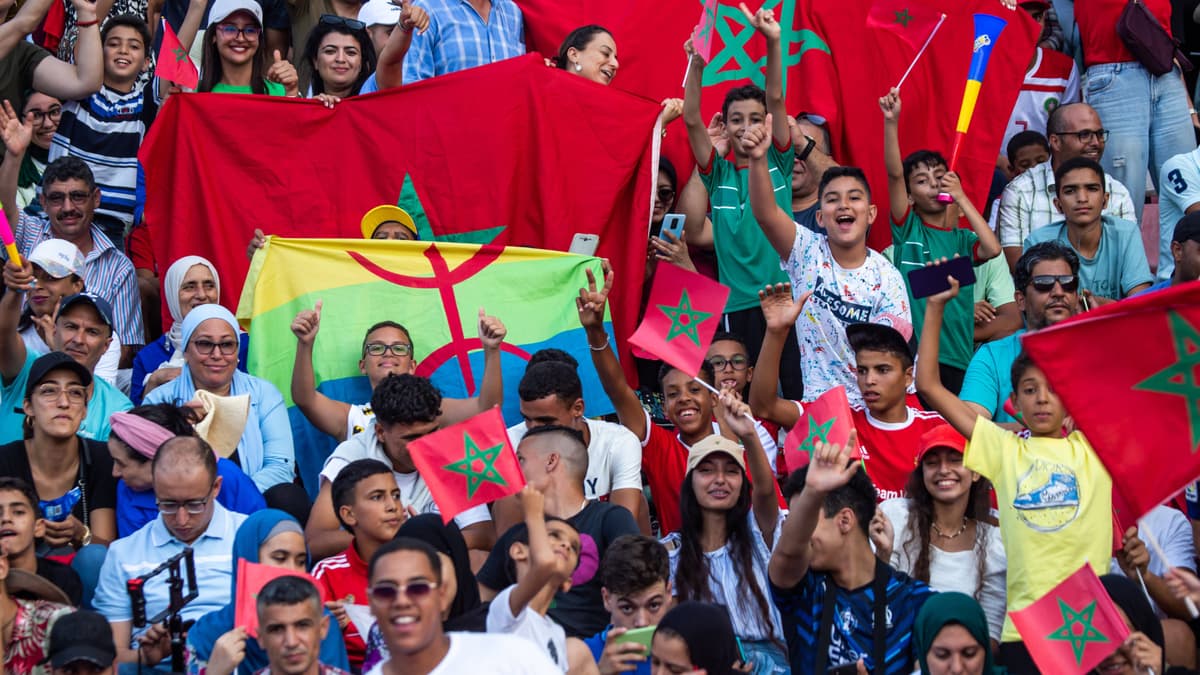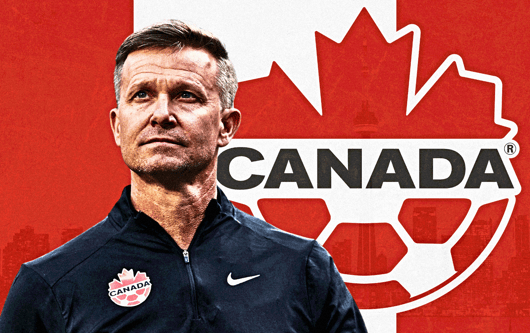-
News
- 13 Feb 2026
Morocco's emergence as an international football hub

Chants of "Dima Maghreb" (Morocco Forever) were one of the defining sounds of the 2022 World Cup in Qatar. While most people around the world remember the tournament for Argentina and Lionel Messi's unforgettable triumph, those in the Arab world are quick to bring up Morocco's historic run to the semi-finals. The Atlas Lions became the first Arab (and African) nation to make it to the final four, knocking out European giants Portugal and Spain along the way.
The rise of Morocco might have gone a little under the radar on the global stage, with the spotlight often shone on their compatriots in the Middle East. Either way, the 2020s should certainly go down as the decade when the Arab world made its mark on the global football stage.
The region has never been short of passionate fans, but they are now getting major events on their doorstep with regularity. As well as Qatar's staging of the World Cup, the massively increased investment in the Saudi Pro League has attracted worldwide attention. The two countries have also hosted almost every major AFC men's event conceivable in recent times; Saudi Arabia secured the rights for the centralised knockouts of the newly reformed AFC Champions League Elite for multiple seasons, while Qatar hosted, and won, the most recent Asian Cup. In the October international break, they both hosted the fourth round of Asian World Cup qualifying as well, handing their teams home advantage at a crucial point on the road to North America. The willingness to put themselves at the centre of AFC events is clear, as are the benefits.
Meanwhile, over in the Maghreb - the westernmost region of the Arab world - Morocco are establishing a similar stature in Africa.
Morocco are making major strides! 📈
In the last three FIFA men’s World Cup tournaments Morocco have participated in, they have achieved their best-ever finishes 🙌
2022 @fifaworldcup: Fourth place
2023 #U17WC: Quarter-finalists
2025 #U20WC: Winners pic.twitter.com/6xHXWZV1A6— FIFA (@FIFAcom) October 21, 2025
Prior to the start of the decade, the kingdom had only ever hosted one major international football tournament: the 1988 Africa Cup of Nations. Even in that instance they were third choice; original hosts Zambia withdrew due to financial issues, and replacements Algeria were stripped of the honour after a dispute CAF.
The kingdom next won hosting rights for AFCON 2015, but were forced to withdraw from the competition with just a couple of months to spare due to the Ebola epidemic in Western Africa.
That was one of the first major decisions taken under the reign of Fouzi Lekjaa, who had become president of the Royal Moroccan Football Federation in the spring of 2014. He has been in post ever since, reforming the domestic scene before turning his attention to the international game. His influence has grown beyond Morocco, becoming a member of FIFA Council in 2021 and being elected CAF first vice-president in April of this year.
With Lekjaa's influence, Morocco was in prime position to step up when, in 2022, Guinea was stripped of the hosting rights for AFCON 2025. In September 2023, it was confirmed that the kingdom would host the AFCON finals again.
That is not all, though. They also have half an eye on 2030, when they will co-host the centennial edition of the World Cup, bringing the tournament to North Africa for the very first time. They have grand designs for the finals, most notably the 115,000-capacity Hassan I| Stadium in Casablanca, but not everyone is onboard. In October, there were violent protests against the spending plans, as protesters asked: "Stadiums are here, but where are the hospitals?"
In the more immediate term, AFCON 2025 will take place between December 21 and January 18. While obviously a major tournament in its own right, it is also being seen as something of a dry run for the World Cup, with some of the country's premier stadiums set to re-open following renovation. Venues that will host games at AFCON - and likely the World Cup too - include the Marrakesh Stadium, the near-70,000 capacity Prince Moulay Abdellah Stadium in Rabat and the 75,000-seater Ibn Batouta Stadium in Tangier.
Besides increasing the country's soft power footprint by staging such major competitions, the government has taken theopportunity to accelerate modernisation and infrastructure development in many parts of the country. Significant construction and redevelopment projects can be spotted all over major cities such as the capital Rabat, the largest city Casablanca, the former capital Marrakesh, and the northern port city of Tangier. The country's high-speed rail network, which tops the speed charts in Africa and is up there with the world's quickest, is also being expanded to improve connectivity between the western city of Marrakesh and the more northern belt that includes Casablanca and Rabat.
Beyond these two tournaments, there is a lot of other international football that has been and will be played in the kingdom. In a confederation where various teams are unable to play at their home due to financial challenges, political issues or conflicts, Morocco's wealth of infrastructure has offered a temporary base to many. Six nations - Comoros, Gambia, Lesotho, Niger, Central African Republic and Madagascar - played nominal home matches in the country in the most recent AFCON qualification, while the likes of Mali, Burkina Faso, Sao Tome & Principe, Sierra Leone, Burundi, Djibouti, Somalia, Congo, Guinea, Ethiopia, Chad and Seychelles have done similar for the ongoing World Cup qualifiers.
And it is not only men's football that is being held in Morocco. Although the women's national team do not have much historic pedigree - they only made their debut in 1998 and after WAFCON 2000 did not appear at any major tournament for two decades - they hosted the
WAFCON for the first time in 2022.
While there are undoubtedly some cultural challenges that have hindered the growth of the women's game in the country, the federation dramatically increased investment in infrastructure and development in the years leading up to the tournament. The stated ambition was to have 90,000 registered players by 2024. As well as state-of-the-art facilities, the country also boasts two fully professional tiers of women's football.
The return on that investment was near instant. WAFCON attendance records were smashed as the hosts made a shock run all the way to the final, where they faced South Africa.
Banyana Banyana had never lifted the trophy before either, but were the much more experienced side and ultimately won 2-1. Despite the result, the tournament was a resounding success for the Atlas Lionesses, who had emphatically announced their arrival not just to the home fans but also to opponents all around the world. Their success secured one of Africa's four spots at the following year's global finals, where they made more history by becoming the first Arab nation in history to reach the knockout rounds of the Women's World Cup on their tournament debut. Like their male counterparts in Qatar 2022, it was a landmark achievement.
The Atlas Lionesses soon got the chance to go a step further, as Morocco hosted WAFCON once again this year.
Scheduling challenges meant that the tournament was played a year later than planned and, with renovation work already underway in preparation for the men's AFCON, it had to be held on a smaller scale. The rebuilt Prince Moulay Abdellah Stadium was not ready in time to host the final, so the smaller Olympic Annex Stadium that lies in its shadow took over instead. Nevertheless, the Atlas Lionesses got a great deal of support as they reached a second successive final, this time falling even more agonisingly short by blowing a two-goal lead in the final against record champions Nigeria.
In 2026, a third consecutive edition of the WAFCON will be held in Morocco, just a couple of months after the men's tournament. Additionally, the next five editions of the Under-17 Women's World Cup will also be staged here - starting with the 2025 edition, which takes place from October 17 to November 8 - as the country continues to establish itself as one of the real hubs of international football of all kinds.
The arrangement is not without its critics. Aside from questions around the fairness of allowing one side to repeatedly play on home soil, there are off-field issues too. While attendances at this year's WAFCON were good for Morocco's games, those that didn't involve the hosts were much smaller. The reality is that travelling to the northern tip of Africa is simply not feasible for many fans on the continent, and that is unlikely to change by next year.
Yet Morocco is the only African country that seems willing to put their hands up and offer to host WAFCON.
In a continent where tournaments have repeatedly been rescheduled, often with little notice, the country's ability to bail CAF out of difficult spots has made it an important and influential ally for the federation. Until other nations can find the means or the inclination to provide an alternative, Morocco's status as the go-to host for African events is unlikely to change.
Words by Neel Shelat.


















